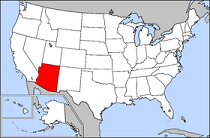Information contained in this publication is intended for informational purposes only and does not constitute legal advice or opinion, nor is it a substitute for the professional judgment of an attorney.
 In a 5-3 decision, the Supreme Court struck down a significant part of the Arizona immigration law on the grounds that those provisions were preempted by federal law. In Arizona v. United States, (pdf) the Court held that three of four contested provisions of the state law – Support Our Law Enforcement and Safe Neighborhoods Act (S.B. 1070) – are preempted by existing federal statutes. Among the invalidated sections was the provision making it a state crime for an unauthorized worker to apply for work or be employed in the state. Though the Court eviscerated this attempt by Arizona to mitigate the substantial deleterious effects of illegal immigration on the safety and well-being of its citizens, Justice Anthony Kennedy, writing for the majority, made it clear that Arizona’s concerns are well-founded and that Congress has both substantial power and substantial responsibility to address Arizona’s concerns and those of its sister states.
In a 5-3 decision, the Supreme Court struck down a significant part of the Arizona immigration law on the grounds that those provisions were preempted by federal law. In Arizona v. United States, (pdf) the Court held that three of four contested provisions of the state law – Support Our Law Enforcement and Safe Neighborhoods Act (S.B. 1070) – are preempted by existing federal statutes. Among the invalidated sections was the provision making it a state crime for an unauthorized worker to apply for work or be employed in the state. Though the Court eviscerated this attempt by Arizona to mitigate the substantial deleterious effects of illegal immigration on the safety and well-being of its citizens, Justice Anthony Kennedy, writing for the majority, made it clear that Arizona’s concerns are well-founded and that Congress has both substantial power and substantial responsibility to address Arizona’s concerns and those of its sister states.
Enacted in 2010, the Arizona law’s stated purpose is to “discourage and deter the unlawful entry and presence of aliens and economic activity by persons unlawfully present in the United States.” Section 5(C) of the controversial state law makes it a misdemeanor for “an unauthorized alien to knowingly apply for work, solicit work in a public place or perform work as an employee or independent contractor” in Arizona. Penalties for violations of this section include a $2,500 fine and incarceration for up to six months. In opposing this section, the United States argued that the provision “upsets the balance struck by the Immigration Reform and Control Act of 1986 (IRCA)” and is therefore “preempted as an obstacle to the federal plan of regulation and control.”
Justice Kennedy writes that “[i]mmigration policy shapes the destiny of the Nation.” He explained that IRCA already requires aliens to register with the federal government and to carry proof of status, mandates that employers verify prospective employees’ employment authorization status, and imposes sanctions on employers who hire unauthorized workers. IRCA does not, however, impose criminal penalties on employees. He writes:
Although §5(C) attempts to achieve one of the same goals as federal law—the deterrence of unlawful employment—it involves a conflict in the method of enforcement. The Court has recognized that a “[c]onflict in technique can be fully as disruptive to the system Congress enacted as conflict in overt policy.” Motor Coach Employees v. Lockridge, 403 U. S. 274, 287 (1971). The correct instruction to draw from the text, structure, and history of IRCA is that Congress decided it would be inappropriate to impose criminal penalties on aliens who seek or engage in unauthorized employment. It follows that a state law to the contrary is an obstacle to the regulatory system Congress chose.
On that basis, the Court found section 5(C) to be preempted.
The Court also struck down section 3 of S.B. 1070, which criminalized an alien’s failure to apply for and carry an “alien registration document” (what is commonly known as a “green card” for immigrants, and an I-94 document for temporary workers or visitors), a “field in which Congress left no rooms for states to regulate.” The Court also invalidated Section 6, which authorizes warrantless arrests if the action was based on probable cause that the individual had committed a public offense that would render them deportable.
The Court, however, concluded that it was premature to strike down Section 2(B) at this point before the section has even gone into effect. Section 2(B) requires state law enforcement officers to verify the immigration status of every person stopped, arrested, or detained if the officer has a “reasonable suspicion” that the individual is unlawfully in the United States. The Court reasoned that it was improper, however, to enjoin Section 2(B) “before the state courts had an opportunity to construe it and without some showing that enforcement of the provision in fact conflicts with federal immigration law and its objectives.”
Justice Kennedy’s opinion was joined by Chief Justice Roberts, and Justices Ginsburg, Breyer, and Sotomayor. Justices Scalia, Thomas, and Alito concurred in part, and dissented in part. Justice Kagan took no part in the decision.
Photo credit: Perry-Castañeda Library Map Collection

